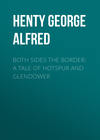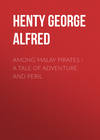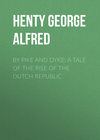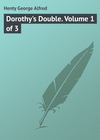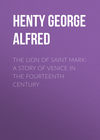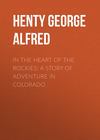Czytaj książkę: «Both Sides the Border: A Tale of Hotspur and Glendower», strona 2
Of other education he had none, but in this respect he was no worse off than the majority of the knights and barons of the time, who were well content to trust to monkish scribes to draw up such documents as were required, and to affix their seal to them. He himself had once, some six years before, expressed a wish to be sent for a year to the care of the monks at Rothbury, whose superior was a distant connection of his father, in order to be taught to read and write; but John Forster had scoffed at the idea.
"You have to learn to be a man, lad," he had said, "and the monks will never teach you that. I do not know one letter from another, nor did my father, or any of my forebears, and we were no worse for it. On the marches, unless a man means to become a monk, he has to learn to make his sword guard his head, to send an arrow straight to the mark, to know every foot of the passes, and to be prepared, at the order of his lord, to defend his country against the Scots.
"These are vastly more important matters than reading and writing; which are, so far as I can see, of no use to any fair man, whose word is his bond, and who deals with honest men. I can reckon up, if I sell so many cattle, how much has to be paid, and more of learning than that I want not. Nor do you, and every hour spent on it would be as good as wasted. As to the monks, Heaven forfend that you should ever become one. They are good men, I doubt not, and I suppose that it is necessary that some should take to it; but that a man who has the full possession of his limbs should mew himself up, for life, between four walls, passing his time in vigils and saying masses, in reading books and distributing alms, seems to me to be a sort of madness."
"I certainly do not wish to become a monk, Father, but I thought that I should like to learn to read and write."
"And when you have learnt it, what then, Oswald? Books are expensive playthings, and no scrap of writing has ever been inside the walls of Yardhope Hold, since it was first built here, as far as I know. As to writing, it would be of still less use. If a man has a message to send, he can send it by a hired man, if it suits him not to ride himself. Besides, if he had written it, the person he sent it to would not be able to read it, and would have to go to some scribe for an interpretation of its contents.
"No, no, my lad, you have plenty to learn before you come to be a man, without bothering your head with this monkish stuff. I doubt if Hotspur, himself, can do more than sign his name to a parchment; and what is good enough for the Percys, is surely good enough for you."
The idea had, in fact, been put into Oswald's head by his mother. At that time the feud with the Bairds had burned very hotly, and it would have lessened her anxieties had the boy been bestowed, for a time, in a convent. Oswald himself felt no disappointment at his father's refusal to a petition that he would never have made, had not his mother dilated to him, on several occasions, upon the great advantage of learning.
No thought of repeating the request had ever entered his mind. His father had thought more of it, and had several times expressed grave regret, to his wife, over such an extraordinary wish having occurred to their son.
"The boy has nothing of a milksop about him," he said; "and is, for his age, full of spirit and courage. How so strange an idea could have occurred to him is more than I can imagine. I should as soon expect to see an owlet, in a sparrow hawk's nest, as a monk hatched in Yardhope Hold."
His wife discreetly kept silence as to the fact that she, herself, had first put the idea in the boy's head; for although Mary Forster was mistress inside of the hold, in all other matters John was masterful, and would brook no meddling, even by her. The subject, therefore, of Oswald's learning to read and write, was never renewed.
Chapter 2: Across The Border
A most vigilant watch was kept up, for the next week, at Yardhope Hold. At night, three or four of the troopers were posted four or five miles from the hold, on the roads by which an enemy was likely to come; having under them the fleetest horses on the moor. When a week passed there was some slight relaxation in the watch, for it was evident that the Bairds intended to bide their time for a stroke, knowing well that they would not be likely to be able to effect a surprise, at present. The outlying posts were, therefore, no longer maintained; but the dogs of the hold, fully a dozen in number, were chained nightly in a circle three or four hundred yards outside it; and their barking would, at once, apprise the watchers in the turrets on the walls of the approach of any body of armed men.
Two days later, Oswald started for his promised visit to the Armstrongs. It was not considered necessary that he should be accompanied by any of the troopers, for Hiniltie lay but a few miles across the frontier. In high spirits he galloped away and, riding through Yardhope, was soon at Alwinton; and thence took the track through Kidland Lee, passed round the head of the Usmay brook, along the foot of Maiden Cross Hill, and crossed the frontier at Windy Guile. Here he stood on the crest of the Cheviots and, descending, passed along at the foot of Windburgh Hill; and by noon entered the tiny hamlet of Hiniltie, above which, perched on one of the spurs of the hill, stood the Armstrongs' hold. It was smaller than that of Yardhope, and had no surrounding wall; but, like it, was built for defence against a sudden attack.
Adam Armstrong was on good terms with his neighbours across the border. Although other members of his family were frequently engaged in forays, it was seldom, indeed, that he buckled on armour, and only when there was a general call to arms. He was, however, on bad terms with the Bairds, partly because his wife was a sister of Forster's, partly because of frays that had arisen between his herdsmen and those of the Bairds, for his cattle wandered far and wide on the mountain slopes to the south, and sometimes passed the ill-defined line, beyond which the Bairds regarded the country as their own. Jedburgh was but ten miles away, Hawick but six or seven, and any stay after the sun rose would speedily have brought strong bodies of men from these towns, as well as from his still nearer neighbours, at Chester, Abbotrule, and Hobkirk.
Oswald's approach was seen, and two of his cousins–Allan, who was a lad of about the same age, and Janet, a year younger–ran out from the house to meet him.
"We have been expecting you for the last ten days," the former exclaimed, "and had well nigh given you up."
"I hold you to be a laggard," the girl added, "and unless you can duly excuse yourself, shall have naught to say to you."
"My excuse is a good one, Janet. My father made a foray, a fortnight since, into the Bairds' country, to rescue some of the cattle they had driven off from our neighbours, some days before. There was a sharp fight, and Allan Baird was killed; and since then we have been expecting a return visit from them, and have been sleeping with our arms beside us. Doubtless they will come someday, but as it is evident they don't mean to come at present, my father let me leave."
"In that case we must forgive you," the girl said. "Some rumours of the fray have reached us, and my father shook his head gravely, when he heard that another Baird had been killed by the Forsters."
"It was not only us," Oswald replied. "There were some of the Liddels, and the Hopes, and other families, engaged. My father was chosen as chief; but this time it was not our quarrel, but theirs, for we had lost no cattle, and my father only joined because they had aided us last time, and he could not hold back now. Of course, he was chosen as chief because he knows the country so well."
"Well, come in, Oswald. It is poor hospitality to keep you talking here, outside the door."
A boy had already taken charge of Oswald's horse and, after unstrapping his valise, had led it to a stable that formed the basement of the house.
"Well, laddie, how fares it with you, at home?" Adam Armstrong said, heartily, as they mounted the steps to the main entrance. "We have heard of your wild doings with the Bairds. 'Tis a pity that these feuds should go on, from father to son, ever getting more and more bitter. But there, we can no more change a borderer's nature than you can stop the tide in the Solway. I hear that it was well nigh a pitched battle."
"There was hard fighting," Oswald replied. "Three of our troopers, and eight or ten of the others were killed. My father was twice wounded, one of the Hopes was killed, and a Liddel severely wounded. But from what they say, the Bairds suffered more. Had they not done so, there would have been a hot pursuit; but as far as we know there was none."
"The Bairds will bide their time," Armstrong said gravely. "They are dour men, and will take their turn, though they wait ten years for it."
"At any rate they won't catch us sleeping, Uncle; and come they however strong they may, they will find it hard work to capture the Hold."
"Ay, ay, lad, but I don't think they will try to knock their heads against your wall. They are more like to sweep down on a sudden, and your watchman will need keen eyes to make them out before they are thundering at the gate, or climbing up the wall. However, your father knows his danger, and it is of no use talking more of it. What is done is done."
"And how is your mother, Oswald?" Mistress Armstrong asked.
"She is well, Aunt, and bade me give her love to you."
"Truly I wonder she keeps her health, with all these troubles and anxieties. We had hoped that, after the meeting last March of the Commissioners on both sides, when the Lords of the Marches plighted their faith to each other, and agreed to surrender all prisoners without ransom, and to forgive all offenders, we should have had peace on the border. As you know, there were but three exceptions named; namely Adam Warden, William Baird, and Adam French, whom the Scotch Commissioners bound themselves to arrest, and to hand over to the English Commissioners, to be tried as being notorious truce breakers, doing infinite mischief to the dwellers on the English side of the border. And yet nothing has come of it, and these men still continue to make their raids, without check or hindrance, either by the Earl of March or Douglas."
"There are faults on both sides, wife," her husband said.
"I do not deny it, gudeman; but I have often heard you say these three men are the pests of the border; and that, were it not for them, things might go on reasonably enough, for no one counts a few head of cattle lifted, now and again. It is bad enough that, every two or three years, armies should march across the border, one way or the other; but surely we might live peaceably, between times. Did not I nearly lose you at Otterburn, and had you laid up on my hands, for well-nigh six months?"
"Ay, that was a sore day, for both sides."
"Will you tell me about it, Uncle?" Oswald asked. "My father cares not much to talk of it; and though I know that he fought there, he has never told me the story of the battle."
"We are just going to sit down to dinner, now," Adam Armstrong said, "and the story is a long one; but after we have done, I will tell you of it. Your father need not feel so sore about it; for, since the days of the Bruce, you have had as many victories to count as we have."
After dinner, however, Armstrong had to settle a dispute between two of his tenants, as to grazing rights; and it was not until evening that he told his story.
"In 1388 there were all sorts of troubles in England, and France naturally took advantage of them, and recommenced hostilities, and we prepared to share in the game. Word was sent round privately, and every man was bidden to gather, in Jedburgh forest. I tell you, lad, I went with a heavy heart, for although men of our name have the reputation of being as quarrelsome fellows as any that dwell on the border, I am an exception, and love peace and quiet; moreover, the children were but young, and I saw that the fight would be a heavy business, and I did not like leaving them, and their mother. However, there was no help for it, and we gathered there, over 40,000 strong. The main body marched away into Cumberland; but Douglas, March, and Moray, with 300 spears and 2000 footmen, including many an Armstrong, entered Northumberland.
"We marched without turning to the right or left, or staying to attack town, castle, or house, till we crossed the river Tyne and entered Durham. Then we began the war; burning, ravaging, and slaying. I liked it not, for although when it comes to fighting I am ready, if needs be, to bear my part, I care not to attack peaceful people. It is true that your kings have, over and over again, laid waste half Scotland; killing, slaying, and hanging; but it does not seem to me any satisfaction, because some twenty of my ancestors have been murdered, to slay twenty people who were not born until long afterwards, and whose forbears, for aught I know, may have had no hand in the slaughter of mine.
"However, having laden ourselves with plunder from Durham, we sat down for three days before Newcastle, where we had some sharp skirmishes with Sir Henry and his brother, Sir Ralph Percy; and in one of these captured Sir Henry's pennant.
"Then we marched away to Otterburn, after receiving warning from Percy that he intended to win his pennant back again, before we left Northumberland. We attacked Otterburn Castle, but failed to carry it, for it was strong and well defended. There was a council that night, and most of the leaders were in favour of retiring at once to Scotland, with the abundance of spoil that we had gained. But Douglas persuaded them to remain two or three days, and to capture the castle, and not to go off as if afraid of Percy's threats. So we waited all the next day; and at night the Percys, with 600 spears and 8000 infantry, came up. Our leaders had not been idle, for they had examined the ground carefully, and arranged how the battle should be fought, if we were attacked.
"Having heard nothing of the English, all day, we lay down to sleep, not expecting to hear aught of them until the morning. It was a moonlight night, and being in August, there was but a short darkness between the twilights; and the English, arriving, at once made an attack, falling first on the servants' huts, which they took for those of the chiefs. This gave us time to form up in good order, as we had lain down each in his proper position.
"A portion of the force went down to skirmish with the English in front, but the greater portion marched along the mountain side, and fell suddenly upon the English flank. At first there was great confusion; but the English, being more numerous, soon recovered their order and pushed us back, though not without much loss on both sides.
"Douglas shouted his battle cry, advanced his banner, fighting most bravely; as did Sir Patrick Hepburn, but for whose bravery the Douglas banner would have been taken, for the Percys, hearing the cry of 'a Douglas! a Douglas!' pressed to that part of the field, and bore us backwards. I was in the midst of it, with ten of my kinsmen; and though we all fought as became men, we were pressed back, and began to think that the day would be lost.
"Then the young earl, furious at seeing disaster threaten him, dashed into the midst of the English ranks, swinging his battle-axe and, for a time, cutting a way for himself. But one man's strength and courage can go for but little in such a fray. Some of his knights and squires had followed him, but in the darkness it was but few who perceived his advance.
"Presently three knights met him, and all their spears pierced him, and he was borne from his horse, mortally wounded. Happily the English were unaware that it was Douglas who had fallen. Had they known it, their courage would have been mightily raised, and the day would assuredly have been lost. We, too, were ignorant that Douglas had fallen, and still fought on.
"In other parts of the field March and Moray were holding their own bravely. Sir Ralph Percy, who had, like Douglas, charged almost alone into Moray's ranks, was sorely wounded and, being surrounded, surrendered to Sir John Maxwell. Elsewhere many captures were made by both parties; but as the fight went on the advantage turned to our side; for we had rested all the day before, and began the battle fresh, after some hours of sleep; while the English had marched eight leagues, and were weary when they began the fight.
"Sir James Lindsay and Sir Walter Sinclair, with some other knights who had followed Douglas, found him still alive. With his last words he ordered them to raise his banner, and to shout 'Douglas!' so that friends and foes should think that he was of their party. These instructions they followed. We and others pressed forwards, on hearing the shout; and soon, a large party being collected, resumed the battle at this point. Moray and March both bore their arrays in the direction where they believed Douglas to be battling, and so, together, we pressed upon the English so hardly that they retreated, and for five miles we pursued them very hotly. Very many prisoners were taken, but all of quality were at once put to ransom, and allowed to depart on giving their knightly word of payment within fifteen days.
"It was a great victory, and in truth none of us well knew how it had come about, for the English had fought as well and valiantly as we did ourselves; but it is ill for wearied men to fight against fresh ones. Never was I more surprised than when we found that the battle, which for a time had gone mightily against us, was yet won in the end. Methinks that it was, to a great extent, due to the fact that each Englishman fought for himself; while we, having on the previous day received the strictest orders to fight each man under his leader, to hold together, and to obey orders in all respects, kept in our companies; and so, in the end, gained the day against a foe as brave, and much more numerous, than ourselves."
"Thank you, Uncle Armstrong. I have often wondered how it was that the Percys, being three to one against you, were yet defeated; fighting on their own ground, as it were. 'Tis long, indeed, since we suffered so great a reverse."
"That is true enough, Oswald. In the days of Wallace and Bruce, we Scots often won battles with long odds against us; but that was because we fought on foot, and the English for the most part on horseback–a method good enough on an open plain, but ill fitted for a land of morass and hill, like Scotland. Since the English also took to fighting on foot, the chances have been equal; and we have repulsed invasions not so much by force, as by falling back, and so wasting the country that the English had but the choice of retreating or starving.
"There is reason, indeed, why, when equal forces are arrayed against each other, the chances should also be equal; for we are come of the same stock, and the men of the northern marches of England, and those of Scotland, are alike hardy and accustomed to war. Were we but a united people, as you English are, methinks that there would never have been such constant wars between us; for English kings would not have cared to have invaded a country where they would find but little spoil, and have hard work to take it. But our nobles have always been ready to turn traitors. They are mostly of Norman blood and Norman name, and no small part of them have estates in England, as well as in Scotland. Hence it is that our worst enemies have always been in our midst.
"And now it is time for bed, or you will be heavy in the morning; and I know that you intend starting at dawn, with the dogs, and have promised to bring in some hares for dinner."
Not only Oswald and Allan, but Janet also was afoot early; and, after taking a basin of porridge, started for the hills, accompanied by four dogs. They carried with them bows and arrows, in case the dogs should drive the hares within shot.
Six hours later they returned, carrying with them five hares and a brace of birds. These had both fallen to Oswald's bow, being shot while on the ground; for in those days the idea that it was unsportsmanlike to shoot game, except when flying, was unknown.
For a week they went out every day, sometimes with the dogs, but more often with hawks; which were trained to fly, not only at birds in their flight, but at hares, on whose heads they alighted, pecking them and beating them so fiercely with their wings, that they gave time for the party on foot to run up, and despatch the quarry with an arrow.
Once or twice they accompanied Adam Armstrong, when he rode to some of the towns in the neighbourhood, and spent the day with friends of the Armstrongs there. For a fortnight, the time passed very pleasantly to the English lad; but, at the end of that time, Adam Armstrong returned from a visit to Jedburgh with a grave face.
"I have news," he said, "that your King Richard has been deposed; that Henry, the Duke of Lancaster, having landed in Yorkshire, was joined by Percy and the Earl of Westmoreland, and has been proclaimed king. This will cause great troubles in England, for surely there must be many there who will not tamely see a king dethroned by treasonable practices; and another, having no just title to the crown, promoted to his place.
"Such a thing is contrary to all reason and justice. A king has the same right to his crown as a noble to his estates, and none may justly take them away, save for treasonable practices; and a king cannot commit treason against himself. Therefore it is like that there will be much trouble in England, and I fear that there is no chance of the truce that concludes, at the end of this month, being continued.
"The fact that the two great northern lords of England are both, with their forces, in the south will further encourage trouble; and the peace that, with small intermissions, has continued since the battle of Otterburn, is like to be broken. Therefore, my lad, I think it best that you should cut short your visit, by a week, and you shall return and finish it when matters have settled down.
"Here in Scotland we are not without troubles. Ill blood has arisen between March and Douglas, owing to the Duke of Ramsay breaking his promise to marry the Earl of March's daughter, and taking Douglas's girl to wife. This, too, has sorely angered one more powerful than either Douglas or March–I mean, of course, Albany, who really exercises the kingly power.
"But troubles in Scotland will in no way prevent war from breaking out with England. On the contrary, the quarrel between the two great lords of our marches will cause them to loose their hold of the border men, and I foresee that we shall have frays and forays among ourselves again, as in the worst times of old. Therefore, it were best that you went home. While these things are going on, the private friendship between so many families on either side of the border must be suspended, and all intercourse; for maybe every man on either side will be called to arms, and assuredly it will not be safe for one of either nation to set foot across the border, save armed, and with a strong clump of spears at his back."
"I shall be sorry, indeed, to go," Oswald said, "but I see that if troubles do, as you fear, break out at the conclusion of the peace, a fortnight hence–"
"They may not wait for that," Adam Armstrong interrupted him. "A truce is only a truce so long as there are those strong enough to enforce it, and with Douglas and March at variance on our side, and Northumberland and Westmoreland absent on yours, there are none to see that the truce is not broken; and from what I hear, it may not be many days before we see the smoke of burning houses rising, upon either side of the border."
"The more reason for my going home," Oswald said. "My father is not likely to be last in a fray, and assuredly he would not like me to be away across the border when swords are drawn. I am very sorry, but I see that there is no help for it; and tomorrow, at daybreak, I will start for home."
That evening was the dullest Oswald had spent, during his visit. The prospect that the two nations might soon be engaged in another desperate struggle saddened the young cousins, who felt that a long time might elapse before they again met; and that in the meantime their fathers, and possibly themselves, might be fighting in opposite ranks. Although the breaches of the truces caused, as a rule, but little bloodshed, being in fact but cattle lifting expeditions, it was very different in time of war, when wholesale massacres took place on both sides, towns and villages were burned down, and the whole of the inhabitants put to the sword. Ten years had sufficed to soften the memory of these events, especially among young people, but each had heard numberless stories of wrong and slaughter, and felt that, when war once again broke out in earnest, there was little hope that there would be any change in the manner in which it would be conducted.
Oswald rode rapidly, until he had crossed the border. The truce would not expire for another thirteen days, but the raiders might be at work at any moment; for assuredly there would be no chance of complaints being made, on the eve of recommencement of general hostilities. He met no one on the road, until he reached the first hamlet on the English side. Here he stopped to give his horse half an hour's rest, and a feed. As he dismounted, two or three of the villagers came up.
"Have you heard aught, lad, of any gatherings on the other side of the border?"
"None from where I came; but there was a talk that notices had been sent, through the southern Scottish marches, for all to be in readiness to gather to the banner without delay, when the summons was received."
"That is what we have heard," a man said. "We have made everything in readiness to drive off our cattle to the fells; the beacons are all prepared for lighting, from Berwick down to Carlisle; and assuredly the Scotch will find little, near the border, to carry back with them.
"You are the son of stout John Forster of Yardhope Keep, are you not? I saw you riding by his side, two months since, at Alwinton fair."
"Yes, I was there with him."
"He will have hot work, if a Scotch army marches into Tynedale. The Bairds will be sure to muster strongly, and they won't forgive the last raid on them; and whichever way they go, you may be sure that your father's hold will receive a visit."
"It was but a return raid," Oswald said. "The Bairds had been down our way, but a short time before, and lifted all the cattle and horses that they could lay hands on, for miles round."
"That is true enough. We all know the thieving loons. But men remember the injuries they have suffered, better than those they have inflicted; and they will count Allan Baird's death as more than a set-off for a score of their own forays."
"If we have only the Bairds to settle with, we can hold our walls against them," Oswald said; "but if the whole of the Scotch army come our way, we must do as you are doing, drive the cattle to the hills, and leave them to do what harm they can to the stone walls, which they will find it hard work to damage."
"Aye, I have heard that they are stronger than ordinary; and so they need be, seeing that you have a blood feud with the Bairds. Well, they are not like to have much time to waste over it, for our sheriff has already sent word here, as to the places where we are to gather when the beacon fires are lighted; and you may be sure that the Percys will lose no time in marching against them, with all their array; and the Scots are like to find, as they have found before, that it is an easier thing to cross the border than it is to get back."
Late that evening, Oswald returned home. After the first greetings, his father said:
"It is high time that you were back, Oswald. Rumour is busy, all along the border; but for myself, though I doubt not that their moss troopers will be on the move, as soon as the truce ends, I think there will not be any invasion in force, for some little time. The great lords of the Scotch marches are ill friends with each other; and, until the quarrel between Douglas and Dunbar is patched up, neither will venture to march his forces into England. It may be months, yet, before we see their pennons flying on English soil.
"My brother Alwyn has been over here, for a day or two, since you were away. The Percys are down south, so he was free to ride over here. He wants us to send you to him, without loss of time. He says that there is a vacancy in Percy's household, owing to one of his esquires being made a knight, and a page has been promoted to an esquireship. He said that he spoke to Hotspur, before he went south, anent the matter; and asked him to enroll you, not exactly as a page, but as one who, from his knowledge of the border, would be a safe and trusty messenger to send, in case of need. As he has served the Percys for thirty years, and for ten has been the captain of their men-at-arms; and has never asked for aught, either for himself or his relations, Percy gave him a favourable answer; and said that if, on his return, he would present you to him, and he found that you were a lad of manners that would be suitable for a member of his household, he would grant his request; partly, too, because my father and myself had always been stanch men, and ready at all times to join his banner, when summoned, and to fight doughtily. So there seems a good chance of preferment for you.
"Your mother is willing that you should go. She says, and truly enough, that if you stay here it will be but to engage, as I and my forebears have done, in constant feuds with the Scots; harrying and being harried, never knowing, when we lie down to rest, but that we may be woke up by the battle shout of the Bairds; and leaving behind us, when we die, no more than we took from our fathers.
